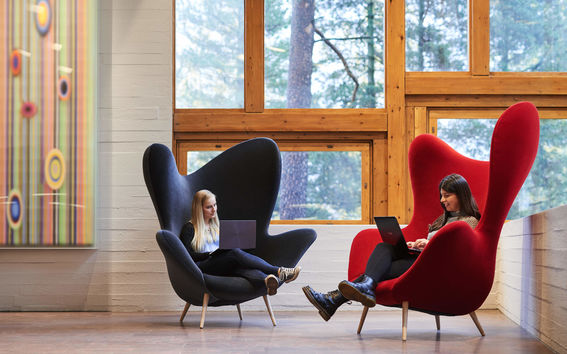Future skills briefcase
In the middle of these fundamental questions, now is the time to actively support students to see, how they can build their future work in these challenging circumstances. To help them find their skills and learn how to put them in use.

Portable take-away skillset
To start this article, I would like to present a few skills that I find crucial when we talk about skills needed in work-life (during the pandemic and in life after it):
- teamwork
- organising
- time management
- listening
- personal motivation
- leadership
- written and verbal communication
Would you agree with the list above? These are so-called portable career skills. They “follow” you in every job and are not work-specific. For me, describing a skill portable is very tangible. I visualise a person with a briefcase, a black one, putting these portable skills into it. Some of the skills are heavier and bigger; some are tiny and perhaps evolving, almost invisible. The person next to you is curious to peek in your briefcase, wanting to know what skills you've got.
The next step: actions
We, who work in education, particularly the teaching staff, are obliged to help students to understand and master these skills. But how does one implement the teaching of basic career skills in one’s own teaching on, let's say for example, in the course of finance or human resources management?
I would often start with a personal touch related to the course topic. Asking questions and trying to find answers together is a good start for everything. I would ask the students to analyse and look around in the room:
- What are the key challenges in this area we are studying?
- How can we solve them?
- How do we find the needed skills in this group to add value, and how do we make everyone reach their full potential?
- Is our group diverse, where are our strengths, what additional skills do we need?
Simple but useful tools for teaching
Let's then talk about the actual tools: What are the tools to enhance the needed career skills in teaching? For example, if you were to focus on teamwork, talk first about:
- how you see teamwork
- the strengths of various teams
- the roles of people in them
- why it is important to work with a diverse group of people with various strengths already during study time.
Make sure you rotate team members, challenge them and make the students analyse not only the content of the assignment but also how the teams worked together. Reflect the positive aspects and challenges they came across.
As I mentioned, those portable skills are not work-specific, but you need them in every profession. So, I want to assure you that you, as a teacher, also have the skills within you already!
Co-learning through cooperation
I wrote this article because I have some recent hands-on experience in co-teaching these career skills at Aalto in a pilot course called Mentoring skills for work-life. The course was a joint effort of Aalto University and Junior Achievement Finland to create a platform for work-life relevant collaboration between high schools and universities.
In this course, the university students mentor high-school students from the Metropolitan area. Both parties learn about their strengths and how to communicate and collaborate coherently in a variety of situations, using initiative, creativity and integrity. Also, the course helps to foster the much-needed positive work attitude.
This course was in my mind a great example of cooperation where Aalto students and the high-school students put future work-life skills into action: collaborating and organising timetable with each other; listening to one another’s experiences, challenges and ideas while building understanding and trust between people; informing other team members; planning the content and next steps for the mentoring process; and above all, learning from each other. What more can a teacher ask for?
I want to thank Aalto Teaching Lab for co-creating and facilitating this course with us. An essential enabler for this collaboration was also our "background support", Professor of Practice, Risto Sarvas from the Department of Industrial Engineering and Management.
Everyday actions make the difference
So, how to act in our daily lives such that we enhance those important skills and traits in young people, as well as ourselves?
The ultimate secret of our future career skills lays in the actions that we take every day. Here are my skills I try to use and foster, as well as embrace in others:
- Talk less, listen more
- Humility engenders learning
- Clear the path for others to follow
- Speak with results, not promises
- Show what you have done, but mindfully
- For every person you meet, ask yourself: how can I help them?
- Trade short-term gratification for a longer-term payoff
- Network with people: you can’t help them if they don’t know what you can do for them
With students, the role of the teacher is to support and facilitate building readiness for life – we all can do it. Remember to start today!
Author:
Eeva Korhonen
Eeva is an Expert and Senior Advisor at Junior Achievement Finland taking care of the elementary school & high school programmes. She is also a previous Swedish teacher and experienced student counsellor who wants to boost high school-university collaboration.
Read more news

Outi Elina Kansanen leaves room for imperfections
In the 100 words series, the Development Manager at the School of Electrical Engineering shares how she has promoted equality, diversity and inclusion at AaltoA survey on users' experiences of Mykanta in collaboration between Aalto University and Kela
Senior university lecturer Sari Kujala's research group is exploring, in collaboration with Kela, users' experiences with the Mykanta online patient portal and the MyKanta mobile application.






